Featured Topics
Featured Products
Events
S&P Global Offerings
Featured Topics
Featured Products
Events
S&P Global Offerings
Featured Topics
Featured Products
Events
S&P Global Offerings
Featured Topics
Featured Products
Events
Language
Featured Products
Ratings & Benchmarks
By Topic
Market Insights
About S&P Global
Corporate Responsibility
Culture & Engagement
Featured Products
Ratings & Benchmarks
By Topic
Market Insights
About S&P Global
Corporate Responsibility
Culture & Engagement
S&P Global — 19 Nov, 2021 — Global
By S&P Global
Start every business day with our analyses of the most pressing developments affecting markets today, alongside a curated selection of our latest and most important insights on the global economy.
U.S. President Joe Biden signed a $1.2 trillion bipartisan infrastructure bill into law this week—creating an opportunity to add trillions of dollars in GDP growth and hundreds of thousands of jobs to the world’s biggest economy in the next decade.
After months of negotiations, the Biden Administration’s Bipartisan Infrastructure Framework outlines funding to create an electric vehicle charging network, update power infrastructure, modernize the country’s electricity grid and transmission capacity, expand broadband access, and accelerate the transition to a lower-carbon energy sector with a plethora of energy, critical minerals, and climate provisions. This infrastructure investment now could add $1.4 trillion to the U.S. economy over an eight-year period, create nearly 900,000 jobs by 2030, and boost private-sector productivity by 10 basis points on average yearly, according to S&P Global Economics.
The country’s metals and mining industry expressed broad support for the plan, but called for additional supply chain support in securing all of the metals needed to actualize the projects funded in the bill, according to S&P Global Market Intelligence.
“From the opening of canals to the interstate highway program, infrastructure has helped the United States become the global economic engine it is today,” S&P Global Market Intelligence said in a recent report. “However, infrastructure has been aging over the past several decades as capital needs are being deferred and the lack of investment is challenging the ability of the U.S. to sustain its economic prosperity.”
The Bipartisan Infrastructure Framework is “a long-awaited solution to one of America's most pressing and overdue problems: aging infrastructure, which is ill-suited to realities of climate change and promises to limit economic growth in the future if not addressed,” S&P Global Ratings said in a recent report. “While most Americans can probably agree that our infrastructure needs upgrading, many of the most significant and pernicious consequences go unnoticed and have affected the most vulnerable and disadvantaged communities most severely.”
“For access to opportunities, transportation infrastructure goes a long way to improving inequity. Aside from general dysfunction, low-income Americans, a considerably more frequent user of public transportation than their wealthier counterparts, disproportionately experience the effects of current infrastructure challenges,” S&P Global Ratings analysts said during a recent S&P Global Infrastructure Ratings' conference panel. “With improvements to Amtrak and inner-city rail, the bipartisan plan gives these communities access to essential human needs in an easier fashion and more affordable fashion, as well. Also, broadband access has become important because of the growing telework and remote-learning environment and the communities that lack this access are in dire need of a way to not fall behind.”
Market participants are watching the Biden Administration’s concurrent legislative efforts to secure support for and pass the social and climate change spending Build Back Better plan, which S&P Global Ratings considers “the definitive next step” in the White House’s infrastructure agenda.
Today is Friday, November 19, 2021, and here is today’s essential intelligence.
Supply Chain Strains And Rising Costs Will Pressure Profitability In 2022
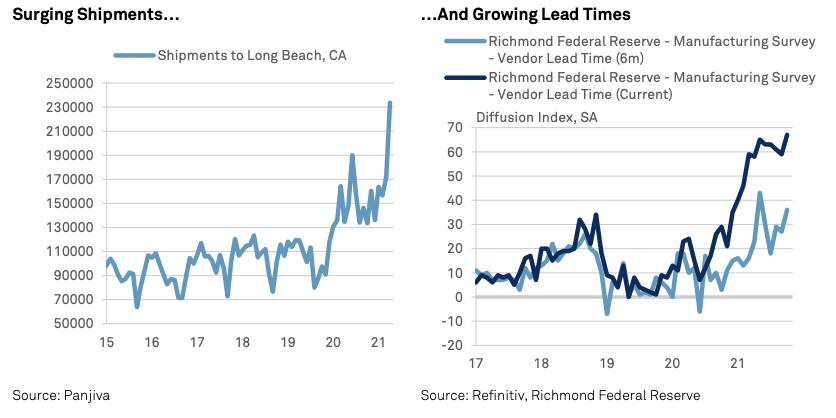
Global nonfinancial corporates appear to be taking supply chain disruptions and soaring cost inflation in their stride. An S&P Global Ratings analysis suggests that in 54 out of 78 global sectors, most companies are finding it very easy or somewhat easy to pass on costs. Based on the last 12 months' results, EBITDA margins look set to hit a new high in 2021.
—Read the full report from S&P Global Ratings
Credit FAQ: Why China Property Firms Are Succumbing To Evergrande Effects
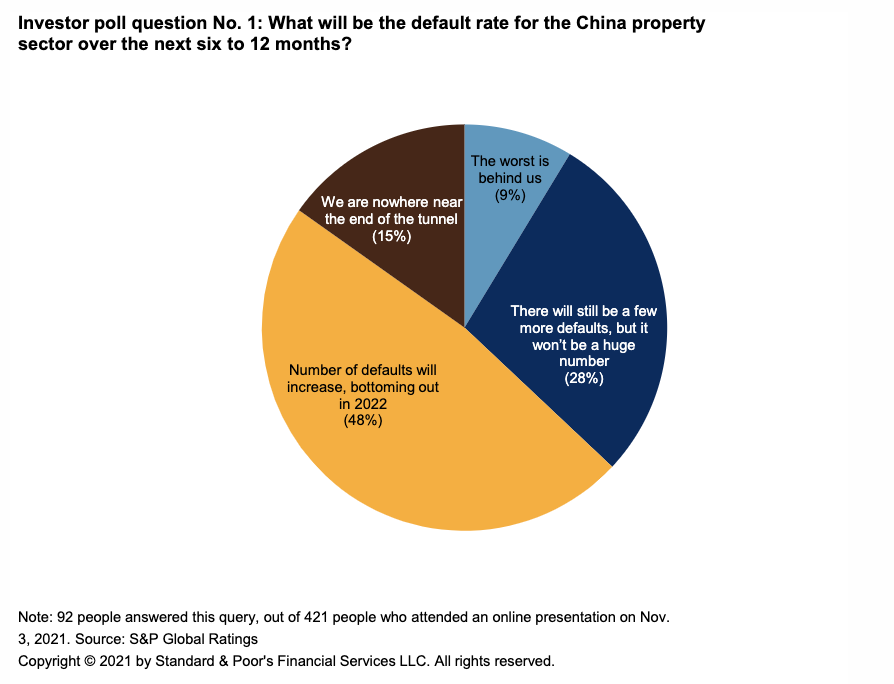
China Evergrande Group's liquidity strains, restrictive policies in China, and a few recent defaults have shut offshore funding for many developers in the country. S&P Global Ratings views this downturn as policy driven and expects authorities to finetune their measures to manage contagion risk.
—Read the full report from S&P Global Ratings
Introducing The S&P 500 Twitter Sentiment Index Series

Over the past few years, social media has evolved to encompass commentary about stocks and financial markets. As the technology has improved, these views are now able to be analyzed; as a result, it is possible to interpret and try to understand what the online community is saying about a specific company by aggregating an analysis of these messages.
—Read the full article from S&P Dow Jones Indices
Industry Report Card: Large U.S. Banks' Profitability Should Rise Despite Limited Reserve Releases
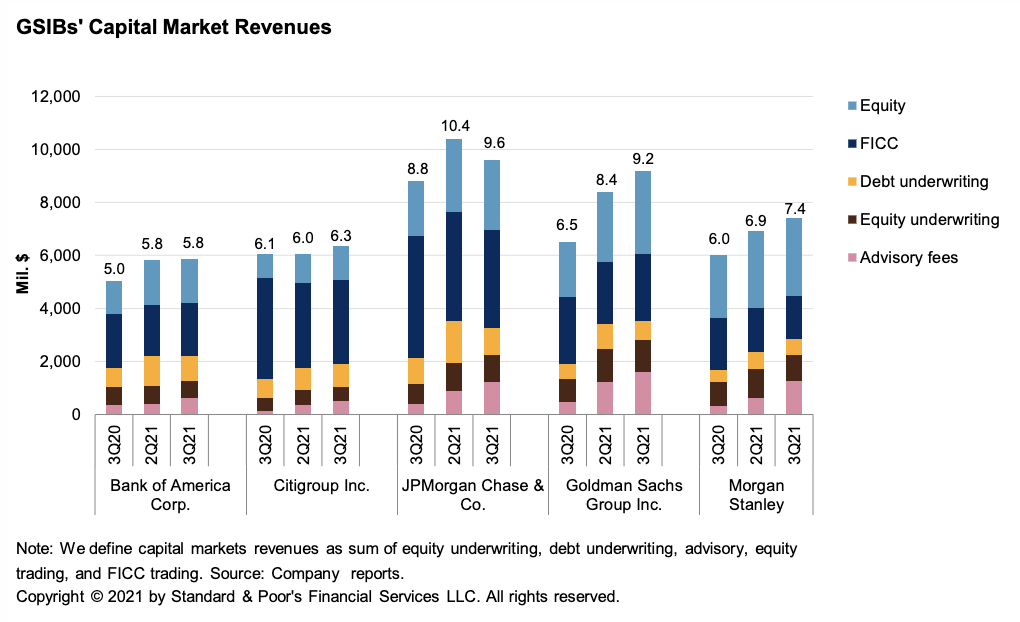
The U.S. global systemically important banks (GSIBs) reported solid third-quarter 2021 results compared with the same period in 2020—benefiting from continued reserve releases, robust capital market revenue, and modest net interest income growth. GSIBs have entered the fourth quarter aided by robust economic growth, benign credit conditions, and the likelihood of further—albeit more modest—reserve releases.
—Read the full report from S&P Global Ratings
Czech, Polish Banks See Q3 Profit Growth, Lower Risk Costs Amid Wider Recovery
Komercní banka a.s. reported the largest year-over-year net profit increase in a sample of nine banks, increasing by 108.5% to 3.4 billion Czech koruny from 1.6 billion koruny a year ago. This surpassed analyst consensus estimates by more than 10%, according to S&P Global Market Intelligence data.
—Read the full article from S&P Global Market Intelligence
Listen: Next In Tech | Episode 40: Tech Goes To Space
Have we crossed a new threshold when William Shatner actually goes to space? Technology’s final frontier has seen skyrocketing interest and investment as hyperscalers and enterprises grapple with putting the promise of space to work. Rahiel Nasir and Craig Matsumoto join host Eric Hanselman to look at how capabilities in space-borne technology are going beyond communications.
—Listen and subscribe to Next in Tech, a podcast from S&P Global Market Intelligence
Broadband Adds Slow As Cable Industry Settles Into Transformative Period
Historically, cable companies experienced bursts and declines related to seasons. College students would add significantly to disconnection and connection numbers in the second and third quarters, respectively, as they left and returned to school. However, with remote work and learning, the concept of seasonality no longer exists to the same degree in the cable industry, analysts say.
—Read the full article from S&P Global Market Intelligence
FTC Nominee Signals Support For Privacy Rules, Big Tech Regulations
Federal Trade Commission nominee Alvaro Bedoya said if confirmed he would make consumer privacy protections a key focus of his work at the agency and also signaled support for addressing Big Tech regulations. Bedoya, a privacy advocate nominated to the FTC by President Joe Biden in September, offered insight into his views on a wide range of topics during a Nov. 17 Senate confirmation hearing, including facial recognition and competition matters.
—Read the full article from S&P Global Market Intelligence
Mind The Gap: Pledges At COP26 Give Hope But Significant Shortfall Still Exists
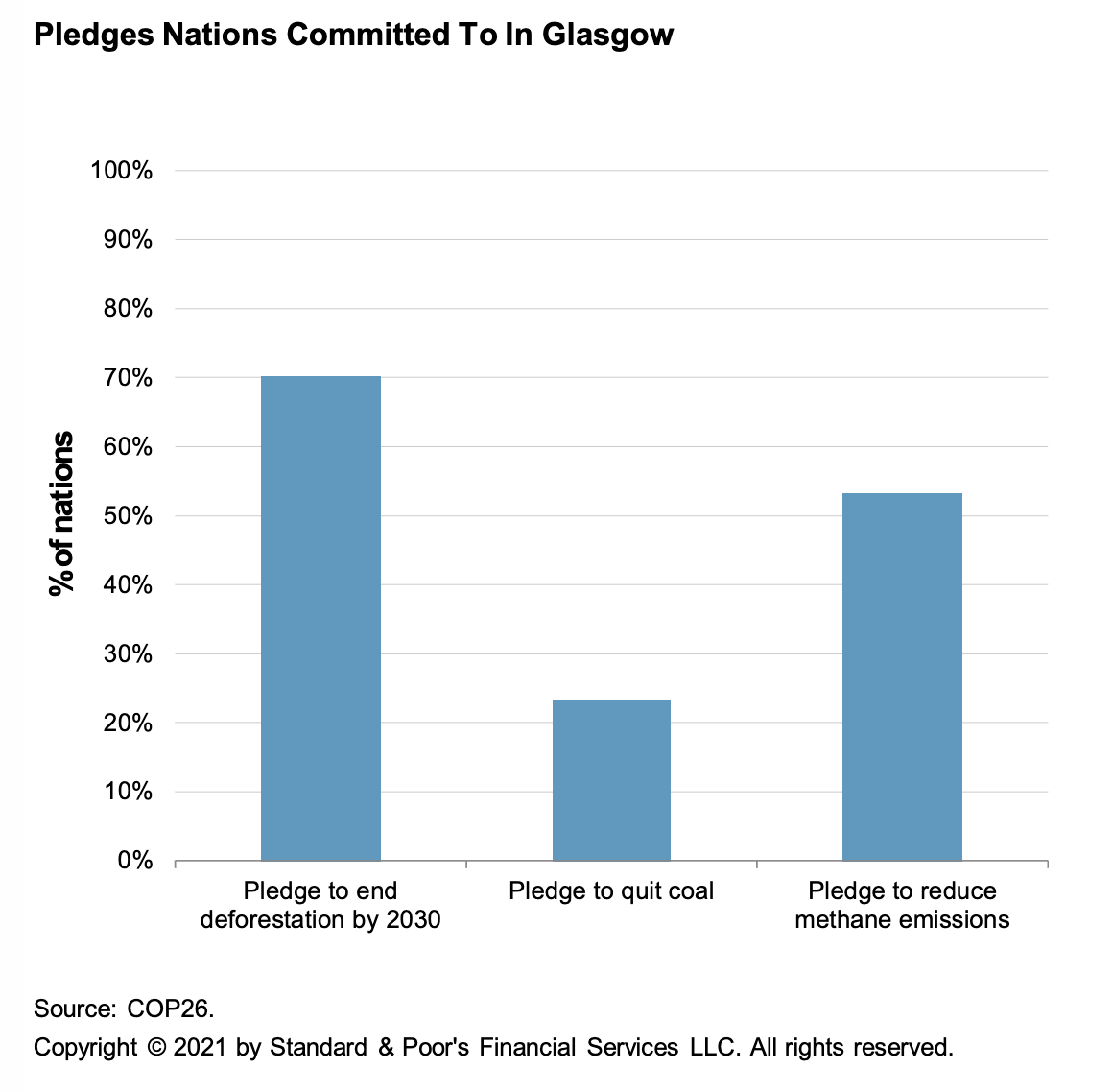
More than 190 countries have agreed to the Glasgow Climate Pact at COP26 that, among other things, pledges to "phase down" coal, said to be the biggest industrial source of greenhouse gas emissions. Although countries agreed to ratchet up their emissions reduction pledges next year to help keep global temperatures to no more than 1.5 degrees Celsius, the gap between what scientists believe to be a safe limit and the existing trajectory of global temperature remains significant.
—Read the full report from S&P Global Ratings
A Food Industry Reset Can Cut At Least 10% Of Global Emissions
Each year, a staggering one-third of food produced globally—worth almost $1 trillion—is lost or wasted, with unconsumed food contributing up to 10% of global greenhouse gases in addition to emissions from farming, processing, and other activities.
—Read the full report from S&P Global Ratings
Banks Can Profit By Helping Firms Implement ESG – Coalition Greenwich
Many companies have embraced environmental, social, and governance-linked securities, with issuances of green bonds more than doubling year over year in the first nine months of 2021 to $365.2 billion, according to Markets Media data cited in the report.
—Read the full article from S&P Global Market Intelligence
California Falling Behind Reaching Clean Energy Goals As Renewables Fill Queue
The Western U.S. has broadly come into alignment to increase renewable capacity with most states setting aggressive clean energy goals, but California is falling behind on reaching its targets, panelists said Nov. 17 during the California Energy Forum.
—Read the full article from S&P Global Platts
Infographic: China’s Soybean Demand Set For Record Levels
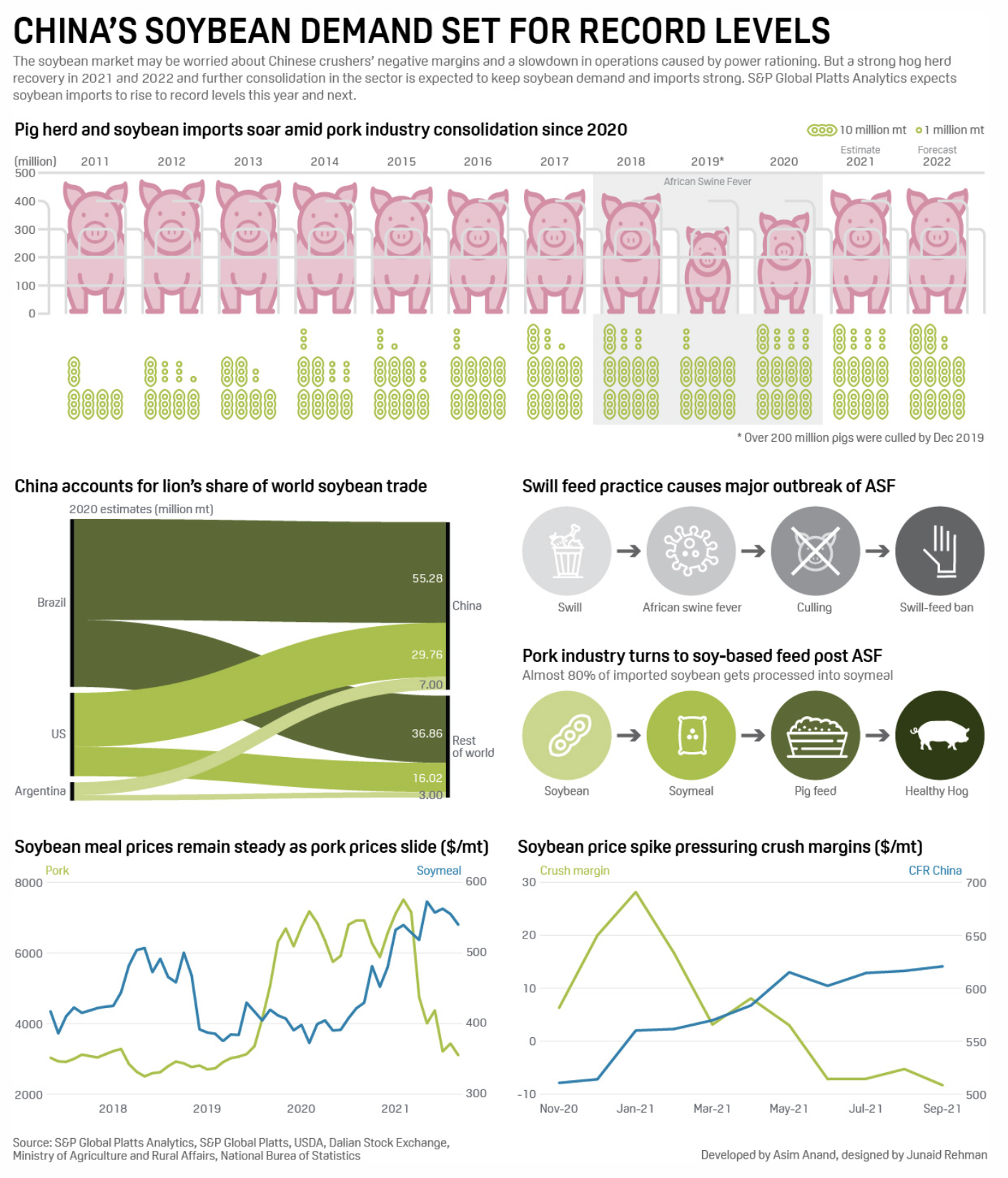
The soybean market may be worried about Chinese crushers' negative margins and a slowdown in operations caused by power rationing. But a strong hog herd recovery in 2021 and 2022 and further consolidation in the sector is expected to keep soybean demand and imports strong. S&P Global Platts Analytics expects soybean imports to rise to record levels this year and next.
—Read the full article from S&P Global Platts
Spotlight: China's October Crude Imports At 39-Month Low, Likely To Rebound On Demand From New Refineries
China's crude imports fell to 39-month low, reflecting stock draws, weak refinery demand, and a likely delay in the reporting of discharged cargoes over the National Day holidays. Deliveries to the independents were also poor as their operating environment has become more difficult with more regulatory scrutiny, in line with government efforts to reduce emissions.
—Read the full article from S&P Global Platts
Feature: Pemex Regaining Sales To Gasoline Stations On Government Moves To Stifle Competition
Retail fuel station owners in Mexico who over the past few years opted for alternative suppliers to Pemex are slowly going back to the state company, as government permitting and compliance measures have begun to hurt their ability to compete, according to market participants and observers.
—Read the full article from S&P Global Platts
Rosneft To Become Germany's Number Two Refiner After Move On Shell Stake
Russian state oil giant Rosneft has acquired Shell's minority stake in the 230,000 b/d PCK Schwedt refinery in northeastern Germany, boosting its downstream footprint in Europe's biggest economy where it will become the second-biggest refiner.
—Read the full article from S&P Global Platts
Written and compiled by Molly Mintz.
Content Type
Location
Language
